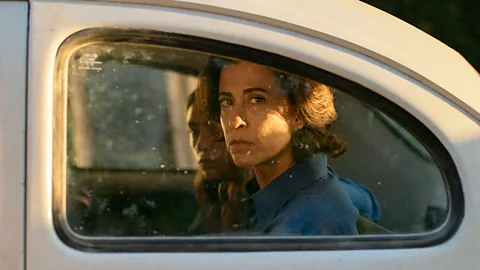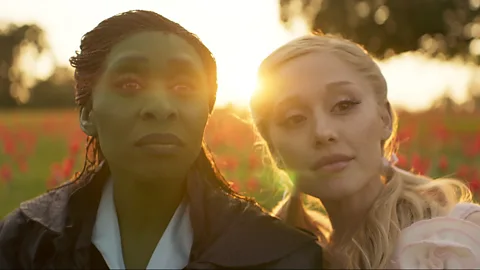From The Apprentice to Wicked, the 2025 Oscar nominations are the most political ever
 Mongrel Media
Mongrel MediaThe contenders for the film industry's biggest prizes this year represent a range of genres and styles. But many are united by a common thread: they take on contentious topics with ferocious energy.
A fabulous range of films has been nominated for Academy Awards this year, from a shiny Broadway musical to a fact-based South American drama, from a rollicking farce about a stripper to an impressionistic period piece set in a Florida reform school. From a distance, it might appear as if the Academy's voters had covered just about every genre and mood that cinema has to offer. But when you look closer, it's remarkable how many of the nominees have something in common. In their own distinctive ways, these films take on contemporary issues with enough ferocious energy to make this one of the most political selections in the history of the Oscars.
In the case of The Apprentice, the political aspect is inescapable. Ali Abbasi's film is a controversial biopic of newly inaugurated president Donald Trump, concentrating on his years as an aspiring real-estate mogul in New York. In October, Trump denounced the film as a "cheap, defamatory, and politically disgusting hatchet job". The Academy seems to have liked the film: The Apprentice received two acting nominations, one for Sebastian Stan, who plays Trump himself, and one for Jeremy Strong, who co-stars as his mentor, Roy Cohn.
 Sony Pictures Classics
Sony Pictures ClassicsOther nominees aren't so blatantly political – indeed, many of them are excellent precisely because they approach politics from unexpected angles – but they're hardly timid in making points which could provoke some viewers. The film with the most Oscar nominations this year is Emilia Pérez, a French musical directed by Jacques Audiard. Its 13 nominations include best picture, best director and best adapted screenplay while its star, Karla Sofía Gascón, is the first trans woman to be nominated for the best actress Oscar, which is quite a statement in a week when Trump signed an order declaring that there are only two sexes recognised in the United States and that that they cannot be changed. What's more, its stand-out song and dance number, the Oscar-nominated El Mal, is an angry condemnation of corrupt politicians and other grandees.
I'm Still Here has done startlingly well, too. Walter Salles' Brazilian drama has been nominated not just in the best international picture category, which most commentators expected, but in the main best picture category. And its star, Fernanda Torres, has been nominated for best actress. These accolades will give a huge publicity boost to a film which is a thoughtful treatise on the importance of being strong-willed and tireless in the face of a totalitarian regime.
In its own more brightly coloured and crowd-pleasing fashion, Wicked has similar themes. Nominated in ten different categories, including best picture, best actress, best supporting actress and best original score, it's a film which seems at first to be a lesson in treating less privileged people kindly. But like the film it's a prequel to, The Wizard of Oz, it has provocative things to say about the nature of power in its depiction of the Wizard as a self-serving ruler who uses fear and deceit to control the population.
And so it goes on. Brady Corbet's The Brutalist, which also garnered ten nominations, including best picture, best director and best actor, is about a Hungarian-Jewish architect struggling to establish himself in the US after World War Two, and Sean Baker's Anora, which has six nominations, including best picture, best director and best actress, is about a sex worker in today's New York. But both of them shine a piercing spotlight on the immigrant experience and the entitlement of the super-rich.
 Universal Studios
Universal StudiosRaMell Ross's Nickel Boys, adapted from Colson Whitehead's novel, and recognised for best picture and best adapted screenplay, doesn't feel like a standard period drama, thanks to its bold use of first-person perspective, but its subject is the US's racist past – and how that past reverberates into the present day. Greg Kwedar's Sing Sing, which has nods for star Colman Domingo and adapted screenplay, too, tells the true story of a theatre group for incarcerated men. It doesn't mention racism at all, but almost all of its characters are black and working class, which says a lot about the reality of US prisons: data published by the Pew Research Center in 2020 showed that at the end of 2018, there were 2,272 prison inmates per 100,000 black men, compared to 392 inmates per 100,000 white men.
Even Dune: Part 2 – nominated for five awards, including best picture – is knottier on the subjects of religion and leadership than the average science-fiction blockbuster. In most years, one or two overtly political films are nominated for Oscars, such as anti-capitalist satire Triangle of Sadness in 2023 and in 2024, Martin Scorsese's dark reckoning with the exploitation of Native Americans, Killers of the Flower Moon. In 2025, such films are the rule rather than the exception.
More like this:
• Why Emilia Pérez is causing upset in Mexico
The question now is whether these political nominations will translate into a political awards ceremony. Traditionally, Oscar acceptance speeches shy away from anything more contentious than asking for more diversity on film sets, as Frances McDormand did when she accepted her best actress award for Three Billboards Outside Ebbing, Missouri in 2018. And when Oscar winners do allude to US politics, they can get a mixed reception, as Michael Moore did when he criticised George W Bush during his acceptance speech for Bowling for Columbine, the 2003 winner of the best documentary prize. But this year feels as if it could be different. The most thrilling part of March’s ceremony might not be seeing who wins, but hearing what they say when they do.
--
If you liked this story, sign up for The Essential List newsletter – a handpicked selection of features, videos and can't-miss news, delivered to your inbox twice a week.
